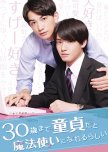
Truly a gem
Restart wa tadaima no atode explores the themes of family, friendship, the searching of one's goals and answers.As a reader of the manga, I enjoyed the film very much. A part of me felt something was missing in the manga, and I found some of those gaps were filled by the live-action film. As a recent graduate, I found myself strongly resonating with both Mitsuomi and Yamato.
Story & Acting:
The story does focus on the bond between Mitsuomi and Yamato; however, it branches out and explores their surrounding characters and settings which I appreciated. I was concerned whether Furukawa-san would be able to capture and dimensionalise Mitsuomi. However, I ended up enjoying his performance as he nailed those emotional scenes with or without dialogue. Ryusei-san also did an excellent job portraying Yamato. I didn't sense any forcefulness with either of their performance. The character interactions and chemistry were there. I appreciated the heartfelt and comedic moments it flowed well with the story.
Cinematography & Music
The soundtrack was okay; it didn't feel out of place, but it wasn't my taste of music (Edit: Some of the tracks grew on me) Some scenes had shaky camera movements and dull lighting. However, that didn't stop me from enjoying the film.
Notes:
I loved the little subtle details in colour coding. There is a portrayal of light and dark contrasts between the two leads viewers may pick up on later scenes.
Final thoughts:
If seeking a light romance film with a slow build-up and relaxing setting I would recommend this film.
For a more in-depth perspective from the characters, I would recommend reading the manga. *Chefs kiss*
Was this review helpful to you?

Story:
The other day, I had finished reading the manga source during the series airing. In terms of story structure, I believe screenwriter, Kitagawa did a brilliant job refining the manga source to develop a more dimensional layer to the series character's including Kagura and Rin. While it changes the characters' arc, it does not deviate too much from its original story.
What makes the series stand out from previous body swaps is that it puts us in the perspective of these characters. Most of the time characters are portrayed to be sure about their attraction toward another. However, in this series, everyone is questioning themselves. The common saying “In any shape or form, I will always love you.” Is an ideal thought which is challenged by the complexity of attraction and self-identity. The series explores questions such as “Can we still love the same person regardless of appearance?" or “Can we only love the person because it is their body and soul alone?." The series scenario becomes intriguing as the impulsive requests of Yashiro and Kagura impact not only themselves but everyone around them.
Usually, Japanese dramas tend to have a maximum of twenty to thirty-minute duration; however, this series has over forty minutes. Therefore, it helped the story pacing and created more room for additional scenes, especially with supporting characters (e.g. parents). The series does little to spend on fillers and unnecessary drama, which increased my interest. However, a minor rushed pacing in the last one-hour episode. While it tried to stay true to the manga chapters' order, it could have been a little more refined in the editing process.
Acting/Cast:
The majority of the main cast are aged close to their respective characters bringing an authentic touch to the series. In terms of character casting, Fujiwara fits the cheerful and lively energy of Yashiro. Kubozuka added the outspoken personality and charisma of Kenta. Arai gave the confident and assuring nature of Rin. While Sakurada’s character, Kagura is one dimensional in the manga, she conveyed the troubled mind of Kagura very well.
Both Fujiwara and Sakurada had a convincing performance playing their body swap personalities. I noticed in casual conversation scenes their mannerism from the way they sit and carry themselves plays an interestingly fun touch to their portrayal. There are moments when the actors do perform in an over-the-top manner, especially the voice changes. However, the actors nailed the emotional scenes.
The chemistry of all the characters was fantastic. I believe the portrayal and direction of Yashiro and Kenta’s bond were more impactful in the series. The backstory scenes build a stronger image of friendship which made me root for the two characters compared to the manga. Without adding spoilers, Kubozuka’s performance strongly shined in one specific episode. Arai as Rin did a brilliant job expressing conflicting emotions of yearning masked by her supportive nature of Kagura. Sakurada and Arai's brilliant chemistry helped build the unrequited/friendship bond between Rin and Kagura fairly quickly in the series.
The portrayal of Kami-sama by Furukawa is slightly toned down compared to his cartoonish personality in the manga. I believe it's a great writing decision as adapting a manga character to live-action can come with challenges to seeing the character in a serious light. The series added some dialogue in later episodes which can spark inspiration in the audience. Shida had a believable performance as Ukon, and I appreciated how the series gave her more involvement than her manga character.
Music:
Warner Bros Japan and Koyama conveyed a soothing track that compliments the natural green scenery and brings a hint of the traditional Japanese period. Innocent by Keina Suda gives an energetically modern vibe to the opening sequence.
Rewatch Value:
I believe it's a nice binge that carefully explores sensitive topics of coming of age in a fun yet somewhat realistic light. As mentioned before, it’s refreshing to see a rom-com supernatural drama where characters lift each other rather than having them be each other's obstacles. This could apply to most love triangle related dramas. From the popularity, it has received on Tik Tok and other social media platforms, I believe the series would have been reacted to and widely enjoyed by overseas audiences.
Overall, the series focus on the character's search for self-acceptance can be applied to any audience. We may sometimes desire to be someone else, to gain approval from others or ourselves. Kami-sama no ekohiiki shows that we can overcome our struggles and learn to accept ourselves moving forward.
If you are looking for a short body swap series with a twist, I would recommend this drama series. It's also not explicit as the manga, which can be watchable for an audience who may not usually be a fan of LGBT or BL related films/series.
Was this review helpful to you?

30-sai made Dotei Da to Mahotsukai ni Nareru rashii
24 people found this review helpful
A Series with Heart and Soul
One of the main aspects that stands out about Japanese drama is their way of including a heartfelt and inspirational message in their stories. I came across Cherry Magic on MDL two months before its official airing date. The plot summary and casting choices intrigued me. I had recognised both of the main leads, Akaso and Machida-san from their previous works, Nee Sensei, Shiranai no? (2020) and Joshi-teki Seikatsu (2018). Since Ossan’s love (2018), Japan has become more open to exploring BL/LGBT genre and well-known actors and actresses featuring in the genre. Considering those points, I had gone ahead and read the first two volumes of the original manga by Toyota-san’s Cherry Magic. The manga’s direction was lighter than other shounen-ai works, and I appreciate Toyota-san writing the characters in a likeable manner.The story could have taken many different directions; however, I appreciate the staff and crew’s mindsets on the drama structure's focus. Having read the manga (Vol 1~4), and watched the drama series, I could sense the amount of thought that went into making the show fitting for a live-action adaptation while bringing heart and soul to these characters.
Most Asian dramas tend to over sexualise and romanticise unhealthy relationships, especially within the BL and LGBT genre. Therefore, the direction of Cherry Magic proves that none of those portrayals is necessary to create an exciting and engaging show. The show features a fair focus on realistic obstacles, including workplace struggles, the risk of striving for your dream goals and self-acceptance.
Acting:
The acting was top-notch; I could feel the character’s emotions, including the scenes without any dialogue. I loved how the main and some of the supporting casts were given a chance to show their range. It helped me become more invested in their characters. Setting the characters in a genre with both slice of life and a supernatural element could be quite challenging. Therefore, I believe the writers did an excellent job writing the main and supporting characters in a relatable and somewhat realistic approach.
Setting:
It was refreshing to see a drama set in a workplace setting with the given genre. It brought more opportunities to explore some realistic obstacles and a sense of relatability towards a mature target audience.
Much analysis has been made on the drama’s setting, placement of props and editing by fans. Although the production value is relatively standard, the staff considers all the mentioned elements, therefore, reflecting the character’s emotions with their given surroundings. I appreciate the setting being viewed more than a stage or an aesthetic; it made me rethink the use of colour palettes (e.g. Blue for gloomy mood by Kurosawa).
Music:
I fell in love with both the opening and ending songs featured in the show. The lyrics had much depth and connection with our two main characters. I found it interesting the opening represents Adachi’s internal feelings while the ending represents Kurosawa’s perspective. Both songs complement each other, and the visuals fit the songs melody. The soundtrack is both amusing and emotionally moving. From my perspective, I did not feel any of the ost or songs were out of place.
Last thoughts:
If you are used to seeing skinship and rapid development featured in romantic relationships, the show may not be your forte; however, I recommend you give the series a watch.. While watching the show; it reminded me that falling in love can be a wonderful thing in life despite the depressing and heartwrenching moments.
Was this review helpful to you?

More than a love story
This was a rollercoaster of a ride!This film had a similar tone to Kimi No Na Wa minus the scifi element. The film's pacing started real fast but gradually became consistent and took its time building and developing the characters.
I loved the film for exploring each characters life journeys. It did not hesitate to show realistic obstacles of children and adults within society. The raw emotions and music played a huge role in bringing a strong, lasting impact on the story. I also appreciated when the film gives a clear backstory and glimpses between the characters.
The chemistry was clearly present between both Komatsu and Suda's performance. The supporting cast nailed their roles and left some strong, lasting moments.
I was surprised the casting director managed to find a child actress resembling Komatsu-san (or it could be make-up).
The story could be rather depressing due to it taking an authentic approach and long duration, which affected my rewatch value. Despite that, I still found the film to be quite inspiring and informative.
If you are interested in a film which explores the themes of self-discovery and gradual slow romantic build up, then I would recommend this film.
Was this review helpful to you?

The Night Beyond the Tricornered Window
10 people found this review helpful
Aesthetically pleasing with slow burn storytelling
This was one of the most anticipated films on my list. Ever since the release of the trailer, the ost and visuals really caught my attention. Judging by the trailer, it seemed pretty appealing in terms of its supernatural story concept and not your typical slice of life bl.Delving into the film, it started off strong with its visuals and character introductions, but the story pacing wasn't quite there.
I found myself pausing a few times throughout the film which was a bit concerning. It indicates the story wasn't engaging in the early stages (first 10 mins mark) especially when it came to the bond between the two main leads.
Story structure
The story went from point A to point B. There wasn't much breathing room to let the audience become invested in the characters. Of course, there were conversations made between main leads including Takito's character, Hanzawa (Cop). However, it took so long for a scene to show a genuine connection and emotion between the characters. The first half of the film felt absent, but its absence was not entirely bad. I replayed some scenes and noticed the silent pain the actors conveyed in their expressions which I appreciated.
I believe the film tried to appeal to a wider audience therefore the relationship between Hiyakawa and Mikado came across as a bit hollow. From a marketing perspective, it seems ideal to want to create a story structure that appeals to and invites both original fans of the source and supernatural enthusiasts. Based on watching the film it seems the film director and producers was struggling to build a gradual bond between the two main leads. It bothered me how everything was resolved at the last minute, but I loved how the threads started to connect together.
Acting
The casting choice was solid. From the beginning, middle to end, Hirate-sans performance kept me engaged and more intrigued with her character. I believe she is one of the idol actresses who does not overact. Okada and Shison-san's performance started to shine just after the 30-minute mark. In the climax scene, I believe everybody performed pretty well.
Music
A few osts caught my interest including when Shison's character has a moment of courage. The trailer song is a banger which I'm pretty sure it relates to one or two of the perspective of the main lead.
Production and Visuals
The CGI and colour gradient reminded me of the Bleach live-action. I appreciated the opening montage and ost. It made me realise the trailer didn't give away everything in the film which was a good sign from my perspective.
Overall, I would have liked to see more of the three main leads. I believe when exploring a manga adaptation especially with three main leads, it would have been great as a drama series or film trilogy. Hopefully, the anime adaptation brings more from the source material.
Was this review helpful to you?

The trouble of blue vampires (and humanity)
Aoki Vampire no Nayami introduces us to the aftermath of the COVID 19 pandemic in Tokyo.The story follows two immature vampires struggling to survive with limited blood supplies whilst living amongst humans in a changing society.
The first episode's opening arc immediately caught my attention. Despite how serious the topic may sound, the 8 episode series blends humour and drama to balance the story. The main and supporting characters all individually have their own personalities and stories.
STORY:
The first thing viewers are introduced to is the drama cover and summary; however, delving into the episodes, we start to learn that the story arc mainly sheds its spotlight on the “people” rather than the “vampires”. I believe this choice of story-telling was made intentionally to create a voice for the voiceless. In other words, each episode introduces a character with their own struggles caused by their surroundings, especially by the pandemic. I found some of the earlier episodes resolved the character arcs too quickly, so it needed a bit of work in terms of pacing.
Some topics include family issues, abuse and work harassment. Many of these issues are common in Japan’s society, with or without the pandemic; therefore, this drama series is relevant to informing viewers of a hopeful outcome to overcoming their struggles. The topics could also inspire overseas viewers as these issues are not limited to Japanese viewers, especially with the COVID-19 pandemic being a global issue.
The troubles of Aoi and Sou’s arc are sprinkled throughout the episodes. If this series had at least 40 minutes per episode, their story could have been fleshed out properly, giving the main leads and guest characters an equal amount of screen time.
In terms of Aoi and Sou, they had an interesting and fun dynamic. Both characters reminded me a little of Drake and Josh; one is mature while the other is goofy and chill. Our main leads may be vampires, but they represent young adults who are forced to adapt and grow (into full-fledged vampires) in a changing environment, hence the pandemic.
Kishiko and Osono were nice addition to the story. Both characters were hilarious and had their brief moments of backstory. I wish we got to see more in-depth exploration. Maybe a clear flashback on these characters.
The regular customers of the cafe all had their charms and moments. It was nice to see each of them contribute in some episodes to connect with the guest characters. Specifically, Mr Oyabu and Nishino were tension breakers to keep the show from seeming too dark. Mia was an interesting character with her own complex and side story. I found her to be grey, and that was intriguing.
ACTING:
Kiriyama Renn - He played his character very well, in my opinion. From the serious to humorous moments, it was not left unforgotten. I had captured many of his scenes for meme-worthy edits. It was pretty interesting seeing his acting grow from my first time seeing him in Switch Girl (2011).
Yuutaro - His acting was so-so. I didn’t find it too bad or phenomenal. I’ve seen his acting background and watched him in 3D kanojo: Real Girl, Cherry magic and Zettai BL. I would be interested to see Yuutaro-san in a darker genre where he breaks away from the cute shounen (young man) role. It seems he gets type-casted into those roles; therefore, it limits viewers from seeing his full potential in acting. I wish him all the best.
MUSIC:
ZAQ - Moonlight - The opening song was very upbeat and catchy, preparing viewers to become hyped for the episode. I’ve roughly translated parts of the songs by hearing the lyrics. To summarise, the opening represents the two blue vampires struggling to get up from their coffins every day “hearing sounds of heartbeats.” I recognised ZAQ as she has covered the opening for the anime, Flip flappers, “Serendipity”. So, I knew I’d get attached to the opening.
Ran - Sekai (The world) - The ending song had a soothing melody in contrast to the opening song. I haven’t analysed the ending song (yet), but from listening carefully to the lyrics. “I wish in this world, we could find a way to understand each other” From my interpretation, this seems to be a very Aoi thing to say. It reflects the inner thoughts of the vampires, more so, Aoi’s perspective.
Overall, if you’re looking for a short drama to be inspired based on the pandemic situation, this show may be for you. It’s not too serious to make you depressed, but it does try to balance both humour and drama. The episodes are roughly 23 mins long, minus the opening and ending songs. Each episode covers different characters with their own obstacles. The main leads can be relatable for both young and older audiences. It’s a show aimed towards the human elements rather than exploring too much into the vampire and supernatural genre.
NOTE: If this gets a season two (which may be unlikely based on the ending conclusion), I hope the show-runners consider giving it international access and not just KKTV (very limited regions). I truly believe this show has the potential to touch international viewers, be explored more and include more build-up on the vampire world.
Was this review helpful to you?

Stayed for the acting
The show screams manga adaption with exaggerated acting and bizarre storyline, therefore, the drama indicates for you not to take it too seriously.I was considering dropping this series because I crave character growth and prefer a clear takeaway from the message of the show. What made me continue watching was mainly the acting of Yamada Yuki. Coincidently I had recently finished watching American Psycho, which is why I wanted to see how he delivers and explores his character till the end. I ended up enjoying his performance and found myself resonating with a few of his internal struggles.
The drama starts to pick up pace as it explores and introduces other characters in the mix.
Moral of the story is everybody has a different side: some who hide it, some who show it.
We are not one dimensional, and it fits the saying 'Don't judge a book by its cover.'
Overall, I enjoyed the comedic aspect of the drama despite its odd and creepy moments. I believe the ending suits and wraps the story nicely.
If you are expecting major character development or a built love story, then this drama might not be for you.
Was this review helpful to you?

This review may contain spoilers
Seiren no zange tackles the complex nature between the media, police and the public. The show tries to throw you off on who is responsible for the given crime; however, the story quickly became predictable. A similar story pattern could be found in a related genre as this one.
While watching all four episodes, it reminded me of how it closely reflects on our current society. Our source of news is flooded with false media and information. Information that tends to jump to conclusions for the sake of benefiting the media workers, not for the victims. The drama series presents this very directly and how their actions could worsen the situation rather than making it better. For example, false accusations via SNS (social media outlets) could cause a psychological impact on a person and change their social life. However, spreading 100% of the truth does not also benefit the victims, as mentioned in the drama. The reasons behind the media's actions were clearly explained in a documentary series called the social dilemma. I thought it was an interesting insight.
Minor Spoilers:
Although the drama series is short with limited development of the characters, it at least tells a clear and somewhat intriguing story. The main message of this series is that there is no black or white pattern or complete good and bad. Majority of the characters were portrayed as a mix, making you reflect on how our 'actions and 'words' affectively cause a scar on our lives.
Overall, the performance is mostly centred on our FL, portrayed by Araki Yuko. She had a strong presence, and although I haven't seen any of her other work, I believe she left a promising impact. The other performances from the victim to the supporting felt slightly average. The music selections were minimal; however, it suited the tone of the story. From my perspective, I wouldn't go back and rewatch this show due to my taste in enjoyment, leaning towards action and comedy genres.
Was this review helpful to you?

Survival of the fittest
Imawa no Kuni no Alice shows the various challenges towards human survival.The 8 episode series manages to include backstories for not only the main but also the side characters—which gives us an understanding of the characters motives and motivations. It brought dimensionality at least towards the characters that played a key role in the story. Also, the characters showed many points of ups and downs that made the story consistent. The acting was not your typical Jmovie style; instead, it was very suitable for the story’s tone and setting. The soundtrack, especially the opening credits conveyed an eerie tone for each episode, therefore, building the suspenseful tension.
Usually, in this given genre of survival game I have a hard time getting invested in the characters, however, this series managed to show the bonds of the characters in a heartfelt and somewhat realistic light. It also takes a lot for me to become emotional for a film or drama. However, the series framework and acting succeeded in making me feel what the main protagonist’s felt during tragic scenes.
Was this review helpful to you?

The story may seem exaggerated and parodied; however, if looking beyond those aspects, the show is a gem. A well-balanced series that tackles serious topics and merges them in a comedic tone without coming across as mockery.
Each side character has a chance to shine throughout the show and get involved in the story narrative. The characters are all chaotic; however, each has their unique traits which could be enjoyable to watch.
The cons I have noticed is despite breaking from the common bl trope, the character development of the main leads are backtracked to extend the duration of the show. Which I found problematic as I felt frustrated that our main protagonist is portrayed indecisive throughout the series with minimal growth.
Overall, if you don't mind shows that don't delve too much in-depth but seeking comedy, non-high school setting and romance I would recommend this show. Would also recommend if considering watching a bl themed drama however not seeking any sexual content but more so the bonds formed between the characters.
The first episode can be a bit of an escalation; however, it gets better and balanced in later episodes.
Story 8.5/10 - May seem cliche at first but becomes more intriguing as characters interact and the story unfolds.
Character development 7/10 - Reasons for some of the characters actions could feel unclear unless rewatched.
Acting 9/10 - Some exaggerated acting but profound moments are well performed.
OST 7.5/10 - Each ost conveyed character emotions; however, some were repetitive and felt plain.
Rewatch value - 8/10 - Would consider watching for missed moments of characters to reflect on how it adds to the story. The comedic moments are meme-worthy and would consider watching after a long busy day.
Was this review helpful to you?

Interesting plot with poor execution
I've noticed Japan's getting better with producing quality BL films/dramas, but they still have room for improvement in their GL.My main reason for watching was because of Mizuhara-san, and I wanted to give Japan another chance for GL themed films. Also, the casting choice seemed pretty solid, and Netflix picked it up, so I thought, "why not?"
Although it was appreciative that the main leads have a connected backstory, the film's plot is all over the place. Mizuhara's character's actions throughout the film were quite questionable. I would interpret her character as maybe bi (?). The goals of these two leads made no sense to me. I could see what falling in love feels like, especially to a person you could never have. You lose a sense of logic and wish for that person's happiness, and sometimes you find yourself to be selfish. But killing someone and losing it all, that aspect and how the film executed it seemed very extreme and unrealistic. What bothered me the most was the toxic relationship between the women. Despite killing off the abusive husband, Nanae still was not free from the inner struggles. Rei's action, including towards Nanae, didn't seem sincere either.
A bit similar to my thoughts on "The cornered mouse dreams of cheese", I felt sorry for the supporting characters affected by the main lead's actions. Don't get me wrong, I felt bad for the main leads upbringing, but many of their situations could have been easily avoided.
OST - Music was pretty decent and chill. It was very obvious they used English songs to attract a wider audience. Cherry by Yui was a huge symbolic ost in the film. Nice use of it.
Overall, I believe with a better story structure and direction, this film could have been better executed. Hopefully, the crew, staff and Japan are open to considering people's feedback on the film for future GL films/drama.
If you're into the dark thriller drama, including GL, and don't mind switching off your brain for a while then, go for it.
If you're looking for a decent GL with a strong story and relationship, this may not be for you.
Was this review helpful to you?

A domino effect full of twists and turns
Firstly, the storyline started off small scaled as shown in the teaser trailer. However the plot gradually branches off and connects the events of the past murders to various characters. It unravels the twisted and corrupt parts of the people within the system and in everyday life.Following the MC, Eiji throughout the journey of uncovering his father's incident, the writer, Okada Michitaka did an excellent job adding subtle hints while also throwing off viewers attention by mainly focusing on Eiji's pov.
There is no filler as everything connects to the root of the 15 year incident. The storyline may seem cramped at times, but it all comes together. During emotional scenes, I believe the director and editor relied too heavily on repetitive flashbacks to carry the emotional factor. It would have been more impactful to rely on the micro expressions of the actors.
In terms of the casts performance, it was intriguing to see Yamada Ryosuke switch between the two opposite personalities of Eiji. I've only seen him in FMA live action, and his performance was well executed here. The supporting casts played their parts, but the culprit actor had a chilling impact.
The ost was so-so. It was great how the music department switched up to instrumental instead of repeating the theme song during certain happy moments.
If you are looking for a psychological mystery series full of mind boggling twists and J-idols this show may be for you.
Was this review helpful to you?

Love is complicated
I came across this drama on one of the "No subs" lists and was surprised to know it was a promo drama for singer MACO.I watched one of MACO's MVs back in 2018. It was called Sweet memory with a very similar concept of heartbreak and longing love. I wonder how much sadness MACO has experienced to produce these tragic love songs.
The mini-series consists of three parts with under 10 mins. Although I felt the music's heart-aching tone to the acting, it didn't give me enough to become fully invested in the characters.
Despite the short duration, it gives a glimpse of realism. We find others, but we eventually tend to drift away from them. It's sad, but that's life. Throughout the series, I wondered if Manatsu had friends to consult her struggles. I felt bad for her.
Overall, if you have short breaks and don't have enough time for a full-length drama, this may be an interesting watch.
NOTE: All episodes are on MACO's official youtube channel (sadly, no English subs)
All three episodes have been English subbed ^_^
Was this review helpful to you?

What saves people is not your powers but the weight of your words
This show had my attention hooked from the first episode. From the various perspectives, plotlines, and time periods, the grim reapers come into contact with the living, it does not shy away from exploring the sensitive and vulnerable aspects of the living and dead.I have viewed many series that explore the themes of suicide, but this show has left a lasting impression. From the visual effects, ost, and film direction, the episodes did an excellent job of capturing the characters' struggles, especially from a psychological lens.The scenes can be seen shot from various angles giving a raw perspective to the audience. Therefore, some scenes can be difficult to watch for some people.
The main aspect of the series include the red thread of fate. The thread is impacted by the choices that people make and influences their connections with how their lives echo onto the next life. Tomorrow is a series that not only informs but highlights that everyone needs an open ear, and a supporting hand and that "What saves people is not your powers but the weight of your words.” -(Director)
Was this review helpful to you?

The Borderland of Life and Death
From the director of Gantz, Bleach and I am a Hero, director and Screenwriter, Sato Shinsuke brings us back to the world of Alice in Borderland with gruesome survival games determining the life and death of those within it.Story:
The first episode had a promising and engaging start picking up immediately from last season's continuation. The stakes are higher and the games are increasingly challenging. Each episode throughout eight episodes covers the different perspectives of recurring and newly introduced characters.
One of the interesting points of this season was how the story revisited past season characters and the reasons behind their motives and actions. This resulted in bringing character development to this season's characters and gives us a better understanding of the games and the borderland.
The cons of this season were the plot armour of supporting roles which took attention out of the scenes. However, the reason was later explained in the plot twist. Also, some screen time was cut for certain characters such as Miyoshi’s character (Rizuna Ann). It would have been interesting to see more of her take on a game as shown in the manga.
In terms of story pacing, the episodes did not rush to conclusion but linger subtle hints while scattering misdirections for each game that unravels a thrilling reveal.
Acting/Casting/Crew:
It is uncertain how faithful the series' characters are to their manga origins. However, the action sequence and the desperation for the character's survival were performed well, especially in the semi-final games.
The arc that seemed neutral was the romance arc in the series. It would have been more impactful if the characters started showing gradual signs in the first season. However, it was better shown in the climax scene which was moving.
Mad props to the cast and crew for the stunt coordination. As seen behind-the-scenes, many stunts were performed by the actors themselves, especially the brutal fight scene in the climax episodes. It was evident, especially with the visual effects, the series was given a higher budget to heighten the strange world of the borderland.
Music:
The same soundtrack produced by composer, Yamada Yutaka was played throughout the series. The music department, Daniel Kresco did not drown out the character dialogues and they were timed appropriately to the given performance and scenes.
Rewatch value:
In conclusion, Alice in Borderland (今際の国のアリス) conveys a strong outlook from the various characters to appreciate the mundane parts of life despite the downsides they have experienced. A rewatch is worth the missed easter eggs, heartfelt moments between characters and the well thought out connections throughout the series.
Was this review helpful to you?


 1
1



















